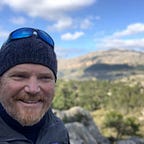Changing the idea of our separateness
I firmly believe that the multiple crises we [as humanity] are facing are symptoms of our pathological habit of understanding and experiencing ourselves as separate from nature, from each other and from the community of life. The same crises are also indications that the healing process is already unfolding.
In Blessed Unrest, Paul Hawken (2007) described how all over the world tens of thousands, possibly hundreds of thousands, of civil society organizations, community groups, activist networks, entrepreneurs and social innovators are working towards a more just, equitable and sustainable future in which humanity can thrive and culture is a regenerative rather than destructive force. He aptly calls this emerging and growing global movement our planet’s immune response.
[…] we are at a threshold in human existence, a fundamental change in understanding about our relationship to nature and each other. We are moving from a world created by privilege to a world created by community. The current thrust of history is too supple to be labelled, but global themes are emerging in response to cascading ecological crises and human
suffering. These ideas include the need for radical social change, the reinvention of market-based economics, the empowerment of women, activism on all levels, and the need for localized economic control. There are insistent calls for autonomy, appeals for a new resource ethic based on the tradition of the commons, demands for the reinstatement of cultural primacy over corporate hegemony, and a rising demand for radical transparency in politics and corporate decision making.Paul Hawken (2007: 194)
All of these trends are evidence that in a world riddled by multiple converging crises worsening fast, something new and miraculous wants to be born. As Arundhati Roy said so eloquently: “Another world is not only possible, she is already on her way. On quiet days I can hear her breathing.” If we take the time to get the questions right, to live the questions more deeply individually and collectively, we will not only be able to hear this new world breathing, we will realize that with each breath we take we are participants in the networks of relationships that are giving birth to this world.
Charles Eisenstein recently provided a lucid exploration of many aspects of the emerging ‘new story’ we are beginning to tell about ourselves in The More Beautiful World Our Hearts Know is Possible (2013). He contrasts the “story of separation” (p.1) that leads us to feel isolated, alienated and insufficient, and thus to compete with each other and to dominate life for our purposes, with the “story of interbeing” (p.15) that acknowledges our relational nature and interdependence.
As the limits of the perspective of separation become more and more evident, and as we find ourselves surrounded by examples of the breakdown, despair and suffering that its cultural dominance is causing, we are beginning to look for viable alternatives, different ways of being-in-the-world.
We are stepping into the ‘story of interbeing’. This story invites us to ask deeper questions: who am I? What makes me come fully alive? What are the deeper needs underlying my perceived needs? What story do I chose to stand in? Who is my community? What is my role? How can I contribute to a more joyful, co-creative, and meaningful world?
Amid all the doom-laden exhortations to change our ways, let us remember that we are striving to create a more beautiful world, and not sustain, with growing sacrifice, the current one. We are not just seeking to survive. We are not just facing doom; we are facing a glorious possibility. We are offering people not a world of less, not a world of sacrifice, not a world where you are just going to have to enjoy less and suffer more — no, we are offering a world of more beauty, more joy, more connection, more love, more fulfilment, more exuberance, more leisure, more music, more dancing, and more celebration. The most inspiring glimpses you’ve ever had about what life can be — that is what we are offering.
Charles Eisenstein (2013: 159)
[This article is an excerpt from my book Designing Regenerative Cultures, published by Triarchy Press, 2016.]
—
If you like the post, please clap AND remember that you can clap up to 50 times if you like it a lot ;-)!
Daniel Christian Wahl — Catalyzing transformative innovation in the face of converging crises, advising on regenerative whole systems design, regenerative leadership, and education for regenerative development and bioregional regeneration.
Author of the internationally acclaimed book Designing Regenerative Cultures
